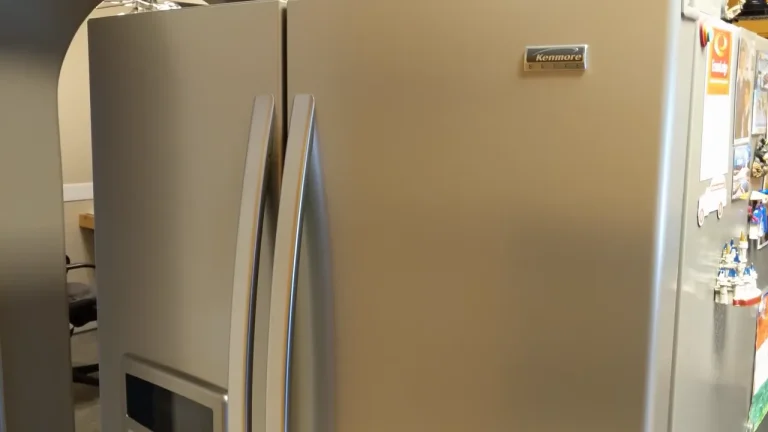Fridge Making Loud Humming Noise? (Troubleshooting Guide)
A loud humming noise from a fridge is often a sign that something needs attention. The most common culprits are the condenser fan and the compressor. Begin by cleaning the condenser coils, as dust and debris can cause the fan to work harder.
Next, check the condenser fan for dirt or wear, and clean or replace it if needed. Ensure the fridge is level, as an unbalanced appliance can vibrate and create noise. Additionally, make sure there’s ample space around the fridge for proper air circulation.
If the noise persists, it could indicate an issue with the compressor, which may require professional repair. Taking these steps should help resolve the humming noise and ensure your fridge runs smoothly.
Is A Noisy Fridge Dangerous?
A noisy fridge can be a cause for concern, but it generally doesn’t pose an immediate danger. It’s important to understand that refrigerators do produce some level of noise during their regular operation, including sounds like humming, clicking, and occasional pops, which are typically considered normal.
However, if your fridge starts emitting loud, unusual, or persistent noises that deviate from its usual operating sounds, it may indicate an underlying issue that requires attention. This could potentially involve components like the compressor, fans, or loose parts within the appliance.
While a noisy fridge itself may not be hazardous, neglecting or ignoring the source of the noise could lead to more serious problems over time. Therefore, it’s advisable to investigate and, if necessary, seek professional help to address any unusual noises emanating from your refrigerator.
Why Is My Fridge Making a Very Loud Humming Noise?
A very loud humming noise coming from your fridge can be indicative of several potential issues. Here are some common reasons why your fridge might be making such a noise:
1. The Appliance Is Unleveled
If your refrigerator is making a loud humming noise, one possible cause could be that the appliance is not properly leveled. When a fridge is not level, it can lead to vibrations and increased noise levels. To address this issue, follow these steps:
Check for Levelness
Use a leveling tool to determine if the refrigerator is sitting evenly on the floor. You can place the tool on top of the fridge and then side to side to ensure it’s balanced.
Adjust the Leveling Feet
Most refrigerators have adjustable leveling feet. These are usually located at the front or bottom of the fridge. Gently turn the leveling feet clockwise or counterclockwise to raise or lower the fridge until it is level. Use a wrench or pliers if necessary.
Verify Stability
Once you’ve adjusted the leveling feet, gently rock the fridge from side to side to ensure it feels stable and doesn’t wobble.
Check for Obstructions
Ensure that there are no items or debris beneath or behind the fridge that might be causing it to be unlevel.
Refrain from Overloading
Avoid overloading the fridge with heavy items on one side, as this can lead to imbalance and
contribute to excess noise.
Monitor for Improvement
After making adjustments, monitor the refrigerator for any changes in noise levels. It may take a little time for the appliance to settle into its new position.
2. The Evaporator Fan Blade Could Be Ice-Obstructed or Damaged
Another potential cause of a loud humming noise in a refrigerator is an ice-obstructed or damaged evaporator fan blade. The evaporator fan is responsible for circulating cool air throughout the refrigerator and freezer compartments. If the fan blade is obstructed by ice buildup or has been damaged, it can lead to unusual noises. Here’s how to address this issue:
Inspect the Evaporator Fan
Locate the evaporator fan, which is typically found in the freezer compartment behind a panel. Check if there’s any visible ice buildup around the fan or if the fan blade appears damaged.
Defrost the Freezer
If you find ice obstructing the fan blade, it’s important to defrost the freezer. Unplug the refrigerator or switch off the power, and leave the freezer door open. Allow the ice to melt naturally or use a gentle heat source like a hairdryer set on low.
Clear Obstructions
Once the ice has melted, carefully clear away any remaining debris or obstructions around the fan blade. Be sure not to force or damage the fan during this process.
Inspect for Damage
Examine the fan blade for any signs of damage, such as bent or broken blades. If you find any, it may be necessary to replace the fan.
Restart the Refrigerator
Plug the refrigerator back in or switch on the power. Allow the appliance to run for a while and listen for any changes in the noise level. If the issue was caused by an ice-obstructed or damaged fan blade, it should now be resolved.
3. The Condenser or Evaporator Fan Motor Could Be Defective
Another potential culprit for a loud humming noise in a refrigerator could be a defective condenser or evaporator fan motor. These fans play crucial roles in the cooling process. The condenser fan dissipates heat from the condenser coils, while the evaporator fan circulates cool air throughout the fridge and freezer compartments. If either of these fan motors is malfunctioning, it can result in unusual noises. Here’s how to address this issue:
Locate the Fans
The condenser fan is typically located at the back of the refrigerator, near the bottom, while the evaporator fan is usually found in the freezer compartment.
Inspect for Visible Issues
Check the fan blades and motor for any visible signs of damage, such as bent blades or loose connections. Also, look for any debris or obstructions that might be hindering the fan’s movement.
Test the Fan Motor
If possible, gently spin the fan blade with your finger. It should rotate freely without any resistance. If it feels stiff or doesn’t turn at all, the motor may be defective and in need of replacement.
Check for Unusual Sounds
While the refrigerator is running, listen for any unusual sounds emanating from the fan motors. Grinding, squealing, or other abnormal noises can indicate a problem.
Replace the Defective Motor
If you determine that the fan motor is indeed defective, it’s advisable to replace it. This typically involves disconnecting the old motor, installing the new one, and ensuring all connections are secure.
4. The Condenser Coils Could Be Filthy
Filthy condenser coils can be a common cause of a loud humming noise in a refrigerator. The condenser coils are responsible for releasing heat from the refrigerator, and if they are covered in dirt, dust, or grime, the compressor has to work harder, which can lead to increased noise levels. Here’s how to address this issue:
Locate the Condenser Coils
The condenser coils are typically located either at the back of the refrigerator or sometimes at the bottom behind a panel.
Disconnect Power
Before starting any cleaning or maintenance, it’s important to unplug the refrigerator from the power source or switch off the circuit breaker to ensure safety.
Inspect the Coils
Examine the condenser coils for dirt, dust, pet hair, and any other debris. If they appear heavily soiled, they likely need cleaning.
Use a Brush or Vacuum
Gently brush or vacuum the coils to remove the accumulated dirt. You may need a narrow brush or a coil cleaning brush specifically designed for this purpose.
Be Gentle
Take care not to bend or damage the coils during the cleaning process. They are delicate components.
Check Other Components
While you’re in the area, inspect other parts for any loose or damaged components that might be contributing to the noise.
5. The Ice Dispenser Could Be Incorrectly Connected or Faulty
If your refrigerator has an ice dispenser and it’s making a loud humming noise, it could be due to incorrect connections or a fault in the dispenser mechanism. Here’s a breakdown of this potential issue and how to address it:
Inspect the Ice Dispenser
Begin by examining the ice dispenser area for any visible signs of loose or improperly connected components. Check for any obstructions that might be interfering with its operation.
Check the Water Supply Line
Ensure that the water supply line connected to the ice maker and dispenser is securely attached and free from any kinks or blockages. A faulty or incorrectly connected water line can lead to unusual noises.
Test the Dispenser
Activate the ice dispenser to observe its operation. Pay close attention to any unusual sounds, such as grinding or clicking, which may indicate a fault in the mechanism.
Look for Loose Parts
Check for any loose or damaged parts within the ice dispenser, such as screws, brackets, or gears. These can create noise if they’re not properly secured.
Inspect the Motor
If the noise appears to be originating from the motor that drives the ice dispenser, it may be faulty and in need of replacement.
6. The Water Line Could Be Dirt-Clogged
If your refrigerator has a water dispenser and it’s producing a loud humming noise, it could be due to a clogged water line. Here’s how to address this issue:
Turn off the Water Supply
Before proceeding, make sure to turn off the water supply to the refrigerator. This is usually done by turning the water shut-off valve located behind or beneath the fridge.
Locate the Water Line
The water line is typically found at the back of the refrigerator, connected to the water supply.
Disconnect the Water Line
Gently disconnect the water line from both the refrigerator and the water supply. Place a towel or a bucket underneath to catch any excess water that may drip out.
Inspect for Clogs
Check both ends of the water line for any signs of blockage or debris. If you spot any, this is likely the cause of the loud humming noise.
Clean the Water Line
Use a pipe cleaner or a small, flexible brush to carefully remove any dirt, debris, or mineral buildup from the inside of the water line.
Reconnect and Turn on the Water Supply
Once the water line is clean, securely reconnect it to both the refrigerator and the water supply. Turn the water supply back on.
Test the Water Dispenser
Activate the water dispenser to ensure that water flows smoothly and without any unusual noises. Keep an eye out for any drips or leaks around the connection points.
GE Fridge Making Loud Humming Noise
If your GE fridge is making a loud humming noise, it could be indicative of several potential issues. One common culprit might be a malfunctioning compressor. The compressor is responsible for circulating refrigerant through the system to cool the fridge. If it’s struggling or failing, it can produce loud noises.
The condenser or evaporator fan motors may be at fault. These fans assist in cooling the fridge and freezer compartments, and if their motors are defective, they can create unusual sounds. Another possibility is dirty condenser coils. When these coils become clogged with dust and debris, the compressor has to work harder, resulting in increased noise levels.
Lastly, an ice-obstructed or damaged evaporator fan blade might be the source of the noise. This fan helps circulate cold air, and if it’s hindered by ice buildup or damage, it can lead to unusual sounds. If you’re uncertain about diagnosing or fixing these issues, it’s advisable to consult a professional technician familiar with GE appliances for accurate diagnosis and repair.
Whirlpool Fridge Making Loud Buzzing Noise
If your Whirlpool fridge is emitting a loud buzzing noise, several potential factors could be contributing to this issue. One common cause is a malfunctioning or overworked compressor. The compressor is a vital component responsible for circulating refrigerant and maintaining the desired temperature.
When it’s struggling or on the verge of failing, it can produce a noticeable buzzing sound. Another possibility is a faulty condenser fan motor. This fan aids in dissipating heat from the condenser coils. If the motor is defective, it may create a buzzing noise during operation. Additionally, if the fridge has an ice maker, a malfunction in its operation can lead to buzzing sounds.
It’s possible that the ice maker’s components or the water inlet valve are causing the noise. If the noise persists and is causing concern, it’s advisable to seek assistance from a professional technician familiar with Whirlpool appliances. They can accurately diagnose the issue and perform any necessary repairs to restore your fridge’s normal operation.
Frigidaire Fridge Making Loud Humming Noise
If your Frigidaire fridge is generating a loud humming noise, it could be an indication of several potential issues. One common culprit might be a malfunctioning compressor. Responsible for circulating refrigerant and regulating the temperature, a struggling or failing compressor can emit noticeable humming sounds.
The condenser or evaporator fan motors may be at fault. These fans facilitate the cooling process, and if their motors are defective, they can generate unusual humming noises. Another possibility is dirty condenser coils. When these coils become clogged with dust and debris, the compressor has to work harder, resulting in increased noise levels.
An ice-obstructed or damaged evaporator fan blade might also be the source of the noise. This fan helps circulate cold air, and if it’s hindered by ice buildup or damage, it can lead to unusual sounds. If you’re unsure about diagnosing or fixing these issues, it’s advisable to consult a professional technician familiar with Frigidaire appliances for accurate diagnosis and repair.
FAQ:
Why is my fridge suddenly making a loud humming noise?
A sudden loud humming noise from your fridge could be due to various reasons. It might be caused by a malfunctioning compressor, dirty condenser coils, a defective fan motor, or an issue with the ice maker.
Is a loud humming noise coming from my fridge dangerous?
While a loud humming noise itself may not be dangerous, it could indicate an underlying problem with your fridge. Neglecting the issue may lead to further damage or even a breakdown of the appliance.
Can I fix a loud humming noise in my fridge myself?
It depends on the cause of the noise. Simple issues like cleaning dirty condenser coils can be addressed by homeowners. However, if the problem involves complex components like the compressor or fan motor, it’s best to seek professional help.
How do I clean the condenser coils to reduce the humming noise?
To clean condenser coils, unplug the fridge, locate the coils (usually at the back or beneath the fridge), and use a coil cleaning brush or a vacuum with a brush attachment to remove dust and debris.
What should I do if the humming noise persists after cleaning the coils?
If the noise continues, there may be a different issue at play, such as a faulty fan motor or compressor. It’s advisable to contact a professional appliance repair service for further diagnosis and repair.
Could a clogged water line cause a loud humming noise in my fridge?
Yes, a clogged water line can lead to a loud humming noise if it’s affecting the operation of the water dispenser or ice maker. Cleaning or replacing the water line may be necessary.
How often should I perform maintenance to prevent a loud humming noise in my fridge?
Regular maintenance tasks like cleaning condenser coils, checking fan motors, and inspecting for loose components should be done every six months to a year to prevent noise issues and ensure the fridge’s optimal performance.
As an Amazon Associate I earn from qualifying purchases.
- Can You Put Clouds Shoes in the Washing Machine? With Tips & Tricks - April 10, 2024
- European Washing Machine vs American – History, Design, Technology - March 27, 2024
- Can You Put Boxing Gloves In The Washing Machine? – Expert Tips - March 25, 2024







![KitchenAid vs Bosch Refrigerator [Which One Fits Your Kitchen?]](https://homeplacetips.com/wp-content/uploads/2023/10/KitchenAid-vs-Bosch-Refrigerator-768x432.jpg)